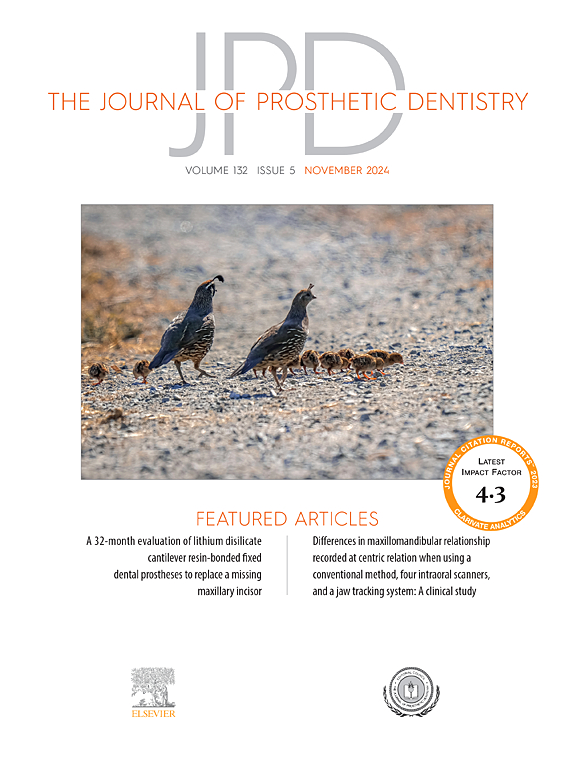Mechanical properties of dental tissue conditioner containing lemongrass essential oil
IF 4.3
2区 医学
Q1 DENTISTRY, ORAL SURGERY & MEDICINE
引用次数: 0
Abstract
Statement of problem
Overcoming compromised oral hygiene and susceptibility to opportunistic oropharyngeal candidal infections in patients with a maxillectomy are critical challenges. Tissue conditioners incorporated with lemongrass essential oil has been shown to have promising antifungal properties, but the effects of this incorporation on the mechanical properties of tissue conditioners remain unexplored.
Purpose
The purpose of this in vitro study was to assess the effects of lemongrass essential oil incorporation at various concentrations on the tensile bond strength (TBS) and Shore A hardness (SAH) of tissue conditioners. The presence of lemongrass essential oil in the tissue conditioner was evaluated by using Raman spectroscopy.
Material and methods
Unmodified tissue conditioner served as the control, whereas tissue conditioner incorporated with lemongrass essential oil (final concentrations of 1.77%, 3.56%, and 7.17% [w/w]) and tissue conditioner incorporated with Nystatin served as the experimental groups. The SAH of Coe-Comfort specimens was measured at 2 hours, 24 hours, 7 days, and 30 days for each testing group (n=3/group). The TBS of tissue conditioner to denture base acrylic resin was determined by using a universal testing machine at a crosshead speed of 10 mm/minute (n=10/group). Furthermore, Raman spectra for the control and experimental tissue conditioner groups were obtained at 24 hours and 14 days. The data were analyzed with 2-way repeated measures ANOVA followed by the post hoc Bonferroni multiple comparison test for SAH testing and the 1-way ANOVA followed by the post hoc Tukey HSD multiple comparison test for TBS testing (α=.05).
Results
The unmodified tissue conditioner, 1.77% (w/w) lemongrass essential oil incorporated tissue conditioner, and Nystatin incorporated tissue conditioner showed no significant difference in SAH at ≤7 days (P>.05). However, at 30 days, the 1.77% (w/w) lemongrass essential oil and Nystatin groups showed no significant difference in SAH (P=.136), but both groups had significantly lower SAH compared with the control group (P=.016 and P<.001, respectively). The incorporation of 1.77% (w/w) lemongrass essential oil in tissue conditioners had no significant effect on TBS compared with the control group (P=.184), although both possessed significantly higher TBS than all remaining groups. In contrast, tissue conditioner incorporated with lemongrass essential oil concentrations ≥3.56% (w/w) and Nystatin showed a statistically significant decrease in TBS (P<.001). Raman spectrum analysis confirmed the presence of citral bands in the lemongrass essential oil incorporated specimens at 2 hours and 14 days, verifying its long-lasting presence.
Conclusions
Incorporation of lemongrass essential oil in tissue conditioners at 1.77% (w/w) concentration produced both long-lasting antifungal properties and acceptable mechanical properties (SAH and TBS).
含柠檬草精油的牙科组织调节剂的机械性能
问题陈述:上颌骨切除术患者的口腔卫生受到影响,容易发生机会性口咽念珠菌感染,克服这些问题是一项严峻的挑战。目的:本体外研究的目的是评估不同浓度的香茅精油对组织调节剂的拉伸粘合强度(TBS)和邵氏 A 硬度(SAH)的影响。使用拉曼光谱评估了组织调节剂中香茅精油的存在:未改性的组织调节剂作为对照组,而添加了香茅精油(最终浓度分别为 1.77%、3.56% 和 7.17% [w/w])的组织调节剂和添加了 Nystatin 的组织调节剂作为实验组。每个试验组分别在 2 小时、24 小时、7 天和 30 天测量 Coe-Comfort 试样的 SAH(n=3/组)。使用万能试验机以 10 毫米/分钟的十字头速度测定组织调节剂与义齿基底丙烯酸树脂的 TBS(n=10/组)。此外,还在 24 小时和 14 天时分别获得了对照组和实验组组织调节剂的拉曼光谱。数据分析采用 2 向重复测量方差分析,然后对 SAH 测试进行事后 Bonferroni 多重比较检验;采用 1 向方差分析,然后对 TBS 测试进行事后 Tukey HSD 多重比较检验(α=.05):未改良组织调节剂、含 1.77%(重量比)柠檬草精油的组织调节剂和含 Nystatin 的组织调节剂在≤7 天时的 SAH 无显著差异(P>.05)。但在 30 天时,1.77%(重量比)柠檬草精油组和 Nystatin 组的 SAH 无显著差异(P=.136),但与对照组相比,两组的 SAH 都显著降低(P=.016 和 PConclusions):在组织调节剂中加入浓度为 1.77%(重量比)的香茅精油,可产生持久的抗真菌特性和可接受的机械特性(SAH 和 TBS)。
本文章由计算机程序翻译,如有差异,请以英文原文为准。
求助全文
约1分钟内获得全文
求助全文
来源期刊

Journal of Prosthetic Dentistry
医学-牙科与口腔外科
CiteScore
7.00
自引率
13.00%
发文量
599
审稿时长
69 days
期刊介绍:
The Journal of Prosthetic Dentistry is the leading professional journal devoted exclusively to prosthetic and restorative dentistry. The Journal is the official publication for 24 leading U.S. international prosthodontic organizations. The monthly publication features timely, original peer-reviewed articles on the newest techniques, dental materials, and research findings. The Journal serves prosthodontists and dentists in advanced practice, and features color photos that illustrate many step-by-step procedures. The Journal of Prosthetic Dentistry is included in Index Medicus and CINAHL.
 求助内容:
求助内容: 应助结果提醒方式:
应助结果提醒方式:


